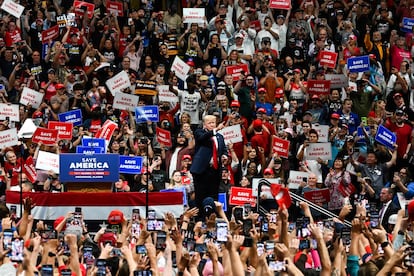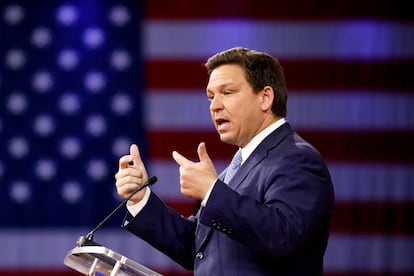Donald Trump on 2024 White House run: ‘I’ve already made that decision’
The former US president says the main question now is whether to announce his bid before or after the November midterms


It’s a very Donald Trump move. The former US president gives an interview to New York magazine that is headlined: “I’ve already made that decision.” That decision is evidently whether he plans to run in the 2024 presidential elections. But has he decided to run or not to run? From the interview, it’s not immediately clear. But he does have this to say: “I feel very confident that, if I decide to run, I’ll win.”
And there are more hints in the interview. “I would say my big decision will be whether I go before or after,” he says in reference to the midterm elections in November, in which a third of the seats in the Senate and the entire House of Representatives are at stake. Trump is back in the game (if he ever left it).
As he showed during his four years in the White House, Trump is better than anyone at moving between suspense and the absurd, all in the name of marketing. For weeks, everyone in Washington had taken it for granted that he would announce he was running in the 2024 election. The real question was when the announcement would be made. The New York magazine interview, at least, narrows down the time frame for the decision.
While some media outlets thought Trump would make the announcement on July 4, Independence Day, the Republican said “that was just fake news.” There are at least two pressing issues that could see the former president announce his White House bid sooner, rather than later. Firstly, US President Joe Biden – his most likely opponent in the 2024 election – is facing a crisis of confidence. A recent poll by The New York Times and the Siena College found that 64% of Democrat voters would prefer he not run for election in 2024.
Secondly, if Trump begins his race for the presidency now, with two and a half years to go until the election, it may distract from the revelations that have come out of the investigation into the insurrection at the US Capitol on January 6, 2021. In the seventh hearing, Liz Cheney, the vice chair of the January 6 committee, revealed that Trump tried to call one of the witnesses in the investigation. The witness did not pick up and told their lawyer, who passed on the information to the committee, which alerted the Justice Department.
Whether Trump announces his candidacy before or after the midterm elections will have an important impact on the November vote – particularly on the Republican Party, which has continued to repeat Trump’s baseless claims that the 2020 election was stolen. The Republicans have so far held primaries in 31 states, and there are 19 more are to go. The results have illustrated the degree of influence Trump still has over the party. The former president backed candidates in all the races, but not all of them have been winners.
If Trump announces that he is running for the White House, it is likely to upset the so-called RINOs, or Republicans in name only, who support issues such as the right to abortion and tighter gun control. Others in the party have also been alarmed by the findings of the Jan. 6 committee, which presented evidence that Trump persisted with his false claims of voter fraud even though many in his close circle, including aides and family members, told him he was wrong.
It will be up to Attorney General Merrick Garland to decide whether to press charges against Trump. But it will not be an easy call. Such a decision would have far-reaching legal and political consequences. It is not even clear whether Garland would legally be able to go after Trump – targeting Biden’s main political adversary could be seen as a conflict of interest. But that is not the only legal worry Trump is facing: he also has half a dozen court cases pending in Washington, New York and Georgia.

Trump has cast a long shadow over the Republican Party, and few have dared to compete with him. His most likely opponent in the Republican primaries is Florida Ron DeSantis, who has made headlines with his conservative policies on issues such as abortion, LGBTQ+ rights and education. His government passed the so-called Don’t Say Gay law, which prohibits class discussion about sexual orientation and gender identity until students are at least nine years old.
But in the New York interview, the former president says he does not consider DeSantis a rival, arguing he only became governor thanks to him. Trump cited a poll that showed he would beat the Florida governor by a wide margin – 58% to 10%. But another poll, from the University of New Hampshire, gives DeSantis a very slight advantage: 39%-37%. Playing fast and loose with the truth, another very Trump move.
Tu suscripción se está usando en otro dispositivo
¿Quieres añadir otro usuario a tu suscripción?
Si continúas leyendo en este dispositivo, no se podrá leer en el otro.
FlechaTu suscripción se está usando en otro dispositivo y solo puedes acceder a EL PAÍS desde un dispositivo a la vez.
Si quieres compartir tu cuenta, cambia tu suscripción a la modalidad Premium, así podrás añadir otro usuario. Cada uno accederá con su propia cuenta de email, lo que os permitirá personalizar vuestra experiencia en EL PAÍS.
¿Tienes una suscripción de empresa? Accede aquí para contratar más cuentas.
En el caso de no saber quién está usando tu cuenta, te recomendamos cambiar tu contraseña aquí.
Si decides continuar compartiendo tu cuenta, este mensaje se mostrará en tu dispositivo y en el de la otra persona que está usando tu cuenta de forma indefinida, afectando a tu experiencia de lectura. Puedes consultar aquí los términos y condiciones de la suscripción digital.








































